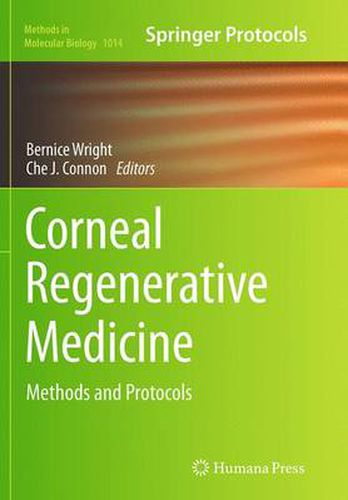Readings Newsletter
Become a Readings Member to make your shopping experience even easier.
Sign in or sign up for free!
You’re not far away from qualifying for FREE standard shipping within Australia
You’ve qualified for FREE standard shipping within Australia
The cart is loading…






This title is printed to order. This book may have been self-published. If so, we cannot guarantee the quality of the content. In the main most books will have gone through the editing process however some may not. We therefore suggest that you be aware of this before ordering this book. If in doubt check either the author or publisher’s details as we are unable to accept any returns unless they are faulty. Please contact us if you have any questions.
Continuous regeneration of the cornea is necessary to maintain this tissue in the transparent state that is essential for vision. Therapy for repair of the damaged anterior cornea is currently addressed through the transplantation of donor corneas or the delivery of limbal epithelial stem cells (LESC) to the ocular surface using amniotic membrane (AM) as a supporting scaffold. Research on the bioengineering of corneal equivalents as replacement tissue is underway to develop viable corneal prosthetics. Corneal Regenerative Medicine: Methods and Protocols provides a concise overview of essential techniques in the field of corneal regenerative medicine, highlighting novel strategies to guide the management of key therapies within this area of medicine. Divided into four convenient sections, topics include the identification, characterisation and cultivation of LESC, as well as the investigation of biopolymers used as the basis for corneal substitutes. Written in the successful Methods in Molecular Biology series format, chapters include introductions to their respective topics, lists of the necessary materials and reagents, step-by-step, readily reproducible protocols, and notes on troubleshooting and avoiding known pitfalls.
Authoritative and easily accessible, Corneal Regenerative Medicine: Methods and Protocols covers the fundamental techniques useful for both the laboratory and clinical settings.
$9.00 standard shipping within Australia
FREE standard shipping within Australia for orders over $100.00
Express & International shipping calculated at checkout
Stock availability can be subject to change without notice. We recommend calling the shop or contacting our online team to check availability of low stock items. Please see our Shopping Online page for more details.
This title is printed to order. This book may have been self-published. If so, we cannot guarantee the quality of the content. In the main most books will have gone through the editing process however some may not. We therefore suggest that you be aware of this before ordering this book. If in doubt check either the author or publisher’s details as we are unable to accept any returns unless they are faulty. Please contact us if you have any questions.
Continuous regeneration of the cornea is necessary to maintain this tissue in the transparent state that is essential for vision. Therapy for repair of the damaged anterior cornea is currently addressed through the transplantation of donor corneas or the delivery of limbal epithelial stem cells (LESC) to the ocular surface using amniotic membrane (AM) as a supporting scaffold. Research on the bioengineering of corneal equivalents as replacement tissue is underway to develop viable corneal prosthetics. Corneal Regenerative Medicine: Methods and Protocols provides a concise overview of essential techniques in the field of corneal regenerative medicine, highlighting novel strategies to guide the management of key therapies within this area of medicine. Divided into four convenient sections, topics include the identification, characterisation and cultivation of LESC, as well as the investigation of biopolymers used as the basis for corneal substitutes. Written in the successful Methods in Molecular Biology series format, chapters include introductions to their respective topics, lists of the necessary materials and reagents, step-by-step, readily reproducible protocols, and notes on troubleshooting and avoiding known pitfalls.
Authoritative and easily accessible, Corneal Regenerative Medicine: Methods and Protocols covers the fundamental techniques useful for both the laboratory and clinical settings.